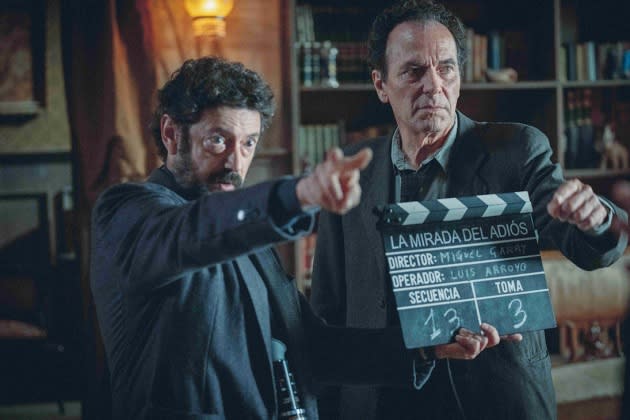‘Close Your Eyes’ Review: Master Spanish Filmmaker Victor Erice’s Moving Homage to the Power of Movies

It’s been 31 years since the great Spanish auteur Victor Erice made his last feature-length film, and as Cannes topper Thierry Frémaux pointed out during a brief introduction to the 82-year-old director’s long-awaited return to the screen, Close Your Eyes (Cerrar Los Ojos), that beats a record previously set by Terrence Malick.
As amusing as Frémaux’s anecdote was, he may have to one day explain why he chose to program such a graceful and powerful tribute to cinema in his festival’s catch-all “Cannes Première” sidebar instead of the main competition, for Close Your Eyes is a consummate work of filmmaking by a major artist.
More from The Hollywood Reporter
Cannes: Alice Rohrwacher on Tomb Raiders, AI and Casting Josh O'Connor in 'La Chimera'
Cannes: 'Anatomy of a Fall' Border Collie Messi Wins Palm Dog in Most Competitive Canine Contest Yet
Cannes: A24 Closes Worldwide Deals for Jonathan Glazer's 'The Zone of Interest'
Slowly but deliberately paced, the movie builds to a crescendo in a closing act where a movie itself — a real movie shot and projected on celluloid — plays a pivotal role, resuscitating forgotten lives and memories as only the cinema can do. Erice has managed, at once slyly and poignantly, to justify his long absence from the scene in a film that’s all about absences, using a medium that many deem to be dying to quite literally bring back the dead.
Stylistically, the very staid and verbose Close Your Eyes may seem distant from Erice’s groundbreaking 1973 debut, The Spirit of the Beehive, or his follow-ups, El Sur and Dream of Light, each made a decade apart. And yet all four works share a similar belief in cinema’s powers to captivate and transform, whether in Beehive’s story of a little girl traumatized by watching Frankenstein, the classic movie star who haunts a man’s life in El Sur, or Dream of Light’s use of the filmic process to capture artistic creation in the making.
Here, cinema is again a means but also an end, and Erice is well-aware of the fact that his beloved medium is no longer the mass cultural juggernaut it used to be, festivals like Cannes aside. The main character in Close Your Eyes is, in fact, an aging filmmaker and novelist named Miguel Garay (Manolo Solo), who, like Erice, hasn’t made a movie in decades, and who now lives like a hermit in a fishing village on the Spanish coast.
How he got there is something the nearly three-hour-long narrative will eventually, and quite movingly, explain, but Miguel’s mystery is not what drives the plot: It’s that of his best friend, Julio Arenas (José Coronado), an actor who was starring in Miguel’s last film when he suddenly disappeared after a few days of shooting, never to return.
The feature they were making was a very Erice-looking drama called The Farewell Gaze, which opens this film and could have been its alternative title. In the one scene that we glimpse up front, an aging and wealthy Spanish-Jewish refugee, who lives on an estate in France dubbed “Triste-le-roi” (The Sad King), hires another man — played by Julio — to find his long-lost daughter, who apparently disappeared in Shanghai during WWII.
Just when we start getting into that story, Erice cuts out and fast-forwards to 2012, where we pick up Miguel, the film’s director, twenty years after the botched production. Arriving in Madrid to participate in an Unsolved Mysteries-style true crime show about Julio’s disappearance, he slowly gets sucked into the intrigue, digging into old archives in a storage unit, visiting his trusty editor and fellow film buff, Max (Mario Pardo), whose stuffy apartment is filled with 35mm cans, and crossing paths with a former flame (Helena Miquel) whom he and Julio were both involved with. The time he spends exploring his past relationships pushes Miguel to not only wonder why the famous actor vanished, but why his own career as a director went astray.
Erice has always used movies within movies as a storytelling device, but here that device becomes his film’s veritable raison d’être. The more Miguel digs into his abandoned project from 20 years prior, the more he learns about both Julio and himself — two friends who met in the Spanish navy and became prominent artists after the reign of Franco. Solo (Pan’s Labyrinth) compellingly plays Miguel as a man past his prime who’s filled with both nostalgia and regret. “We are nobodies,” he says at one point, while his buddy Max explains that the best way to grow old is to do so “without fear, nor hope.”
And yet for all its talk of giving up the ghost, Close Your Eyes ultimately turns into a story about how things that were long-abandoned or seemingly dead — whether Julio, Miguel’s movie or the cinema itself — may not be after all. It’s better to see Erice’s film for yourself to learn what finally happens, and be advised that this does require patient viewing: The story creeps along at a leisurely pace, even if everything in it has a purpose and its power builds gradually over the extended running time.
In the movie’s haunting and affecting closing reels, the pessimism of its early sections gives way to a series of small miracles, whether on or off the screen. In those moments, Erice tips his hat to the medium he cherishes, including a quip about the legacy of Carl Theodor Dreyer and a lovely sequence where Miguel performs a cover of Ricky Nelson’s “My Rifle, My Pony and Me” from Howard Hawks’ Rio Bravo. The final scene in Close Your Eyes, set, of course, in an old movie theatre, brings us back to the opening. All the pieces fall into place and we’re left with one question: If cinema is dead, then why is this film so alive?
Best of The Hollywood Reporter

 Yahoo News
Yahoo News 